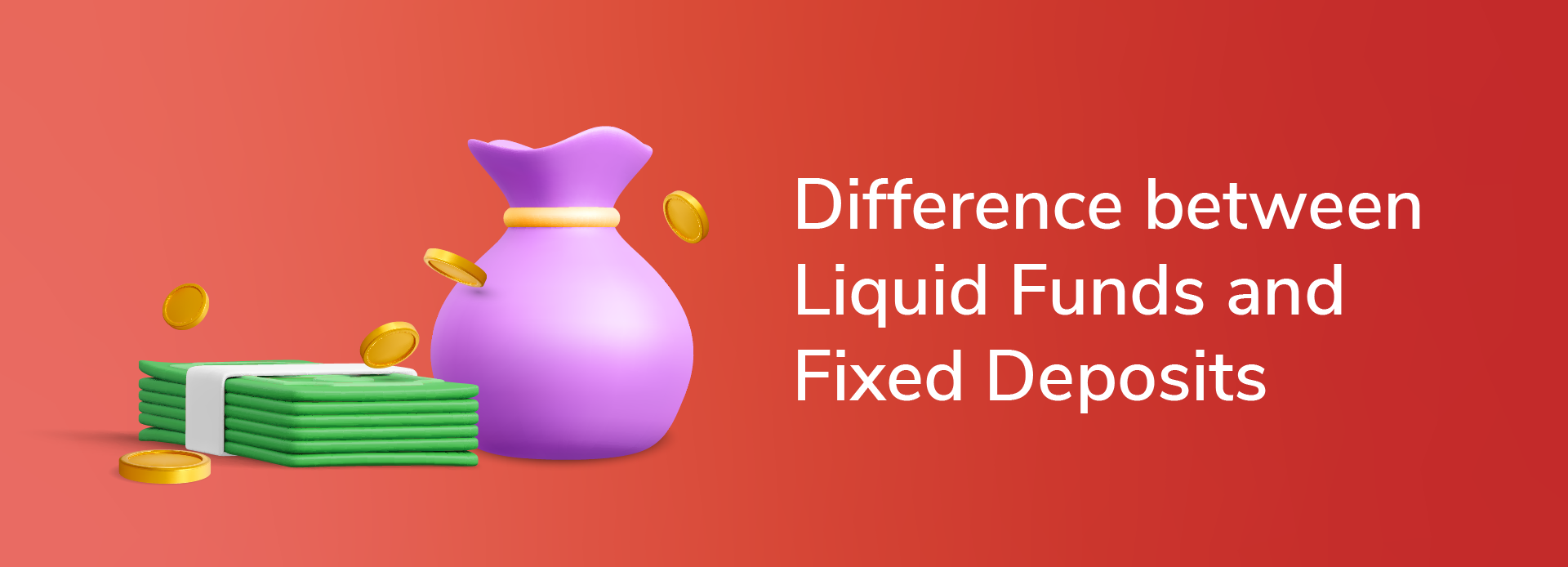
Understanding the Differences between Liquid Funds and Fixed Deposits
16 May 2024 | By INDIE
Amidst economic uncertainties and market volatility, many individuals seek refuge in relatively safe investment avenues to safeguard their hard-earned money. Whether building a nest egg for the future, preparing for unforeseen expenses, or simply preserving capital, the quest for stability is universal. This is where Fixed Deposits (FDs) and liquid funds emerge as allies for investors.
But should you invest in an FD, liquid fund, or both? Let’s find out more about the liquid funds vs. FD comparison.
Liquid Funds: Definition, Features, and More
Liquid funds represent a category of debt mutual funds renowned for their relatively high liquidity and low-risk profile. These funds primarily invest in short-term money market instruments such as treasury bills, commercial papers, and certificates of deposit, with varying maturities ranging from a few days to a few months.
Here are some of their key features:
● The hallmark feature of liquid funds lies in their ability to facilitate quick redemption, often within 24 hours.
● These funds tread cautiously in the risk domain by investing in short-term debt securities adorned with high credit ratings.
● While liquid funds may not promise very high returns akin to their riskier counterparts, their primary objective revolves around furnishing investors with consistent returns over time.
Fixed Deposits: Definition, Features, and More
Fixed Deposits, also known as FDs, are a kind of investment option offered by financial institutions and banks. They represent a time-bound investment where investors deposit a sum of money for a certain duration, determined by them, at a fixed interest rate. FDs are preferred by those seeking assured returns.
While FDs offer the advantage of capital safety, they often come with some key features and limitations on liquidity.
Some of the key features of FDs are as follows:
● When investors deposit a lump sum in an FD for a specified tenure, they receive a certain interest rate for the entire duration. This enables predictability in returns.
● FDs offer flexible tenure options to investors so that they can choose a duration for the investment that aligns with their financial goals and objectives.
● The interest earned on FDs is subject to taxation, added to the investor's taxable income, and taxed at the applicable income tax rate.
● Unlike liquid funds, FDs typically lack liquidity, as investors need to commit their funds for the entire duration of the deposit.
Recommended Read: Tax Implications on Fixed Deposit Interest
Liquid Funds vs. FD: Comprehensive Comparison
Criteria |
Liquid Funds |
Fixed Deposits (FDs) |
Investment Type |
Mutual Fund |
Bank Deposit |
Nature |
Market-linked |
Fixed |
Returns |
Variable, but moderate |
Fixed, predetermined |
Liquidity |
High |
Low |
Risk Level |
Low |
Very low |
Investment Horizon |
Short-term |
Short to Long-term |
Flexibility |
Allows frequent withdrawals without penalties |
Typically, limited to no withdrawals or penalties for early withdrawal |
Interest Rate |
Subject to market conditions |
Fixed, predetermined |
Taxation |
Taxed as per capital gains tax |
Taxed as per income tax |
Suitability |
Suitable for short-term parking of funds, emergency savings |
Suited for individuals seeking moderate returns over a fixed period |
Liquid Fund Vs. FD: How to Choose Between the Two?
The decision between liquid funds vs. FD investments hinges on your financial objectives, investment timeline, and risk tolerance. Here's a concise guide to assist you in making a well-informed choice:
You can choose to invest in liquid funds if:
● You require quick access to your funds for unforeseen expenses or short-term objectives
● Your investment strategy leans towards low-risk options with consistent returns
● Tax efficiency is a priority, especially if you fall into higher tax brackets
On the other hand, you can invest in FDs if:
● You have a specific long-term financial goal and prefer a fixed investment timeline
● Preservation of capital is paramount, and you seek assured returns
● You're comfortable with locking in your funds for a predetermined period
● You prefer the simplicity and predictability of traditional investment avenues
Start planning for your future with Fixed Deposit by INDIE today!
Disclaimer: The information provided in this article is generic and for informational purposes only. It is not a substitute for specific advice in your circumstances. Hence, you are advised to consult your financial advisor before making any financial decision. IndusInd Bank Limited (IBL) does not influence the views of the author in any way. IBL and the author shall not be responsible for any direct/indirect loss or liability incurred by the reader for making any financial decisions based on the contents and information.




